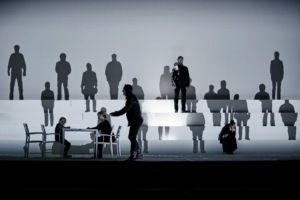Things to do
Opera review: Brothers, an intense dramatic performance
This article is more than 8 years old.
★★★★★☆

Reminiscent of a classic white mausoleum, sober and minimalist (photo: Den Jyske Opera)
Brothers the Opera, part of the Bier Trilogy created especially for the Aarhus 2017 program, had its premiere on Wednesday at Musikhuset. A full house of pleased attendees clapped incessantly.
We had long awaited the Bier Trilogy with anticipation, and the day of the premiere of the first part, ‘Brothers – The Opera’, performed in English, finally arrived this week. It was one of those summer nights in Aarhus, and the crowd slowly started gathering outside Musikhuset. As we entered the Store Sal you could feel the excited expectation of the attendees. The room was full and the loud murmur of people chatting resonated. At 19:30 sharp, silence took over.
The curtains opened to a completely white stage. It reminded me of a classic white mausoleum, sober and minimalist. All that white clearly meant to highlight the tension. The characters’ costumes matched the simplicity in tones of black and grey, as did the choir’s.
Nothing about this opera will remind you of an Italian one. I dare say that it follows the trend of the sober Nordic style in general and is perhaps a means for director Kasper Holten to be innovative, as he is known from his repertoire. Certainly, the setting is there to challenge the imagination of the audience, proving that the story, told through the music, is the most important part.
No need for words
The looks between the characters say everything, and that’s how the audience understands what’s going on. There’s no need to specify the death of Michael for instance; you can see it in the look of desperation of his wife, Sarah – played by the wonderful Swedish soprano Marie Arnet – the same desperation seen in the ongoing suffering and betrayal, and when Sarah and Jamie slowly start falling in love while Michael is missing.
While Sarah sings and mourns, the stage is lit in a furiously fiery red, one of the few times it changes colour. This game with the lights and shadows takes you backwards and forwards between the different moods present throughout the performance, involving you with the tension on stage.
It is sometimes difficult to follow the libretto to the word whilst trying to follow the action. An on-screen transcript helps you understand what is being sung, which makes it easier. However, this tends to be common in operas in English, as most of the vowels tend to sound the same. The sopranos have to tune in their vocal tract to be listened over the orchestra and to amplify the sound, so some of the words are sacrificed. But what matters most are the beautiful voices you are witnessing.
And the music. Created by Icelandic composer Daniel Bjarnason, the score is magnificent. Although it is his first work in the opera genre, he is known around the world for his impressive compositions. The music completely transports you to another universe with its movie soundtrack style. Aggressive, dramatic, it’s the kind of music that builds up and explodes, perfectly illustrating the tension of Bier’s drama.
The little one steals the show
Michael and Sarah’s daughter, played by Selma Vilumsen, appears on stage at the beginning of the show in what is seemingly a minor role. But the moment she opens her mouth: WOW. It was a delightful surprise to hear such a beautiful and angelic voice. She definitely wins our hearts.
Overall the cast is outstanding. South Africa’s Jacques Imbrailo as Michael is splendid in the leading role. Jakob Christian Zethner and Anne Margrethe Dahl offer strong support as Michael’s parents. Jamie ‘the loser’ brother enjoys a safe flight under Joel Annmo’s wing and Denise Beck as Peter’s wife also stands out. Plus the choir: their role as the conscience of Michael is a great tool to reflect the terrible thoughts that go through his mind after the war.
A relatable story
Kasper Holten’s take on Susanne Bier’s psychological drama is a compelling adaptation. Expect high drama and moments of happiness, but mostly sadness and hard-hitting scenes. The story is one of war and love, and given its contemporary nature one we can easily relate, allowing you to feel closer as an audience.
The tension never ceases to build. Until we get to the peak, there are few breathing moments. No respite! The climax comes and the audience claps for the first time in the whole performance. And they keep clapping for a long time, as Danes do. It’s a display of talent by which we are truly wowed.










































